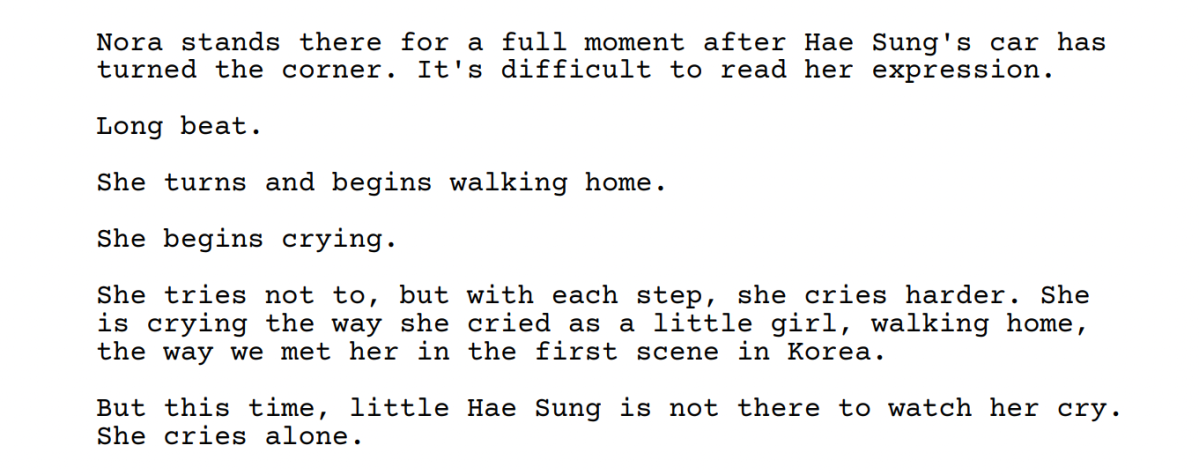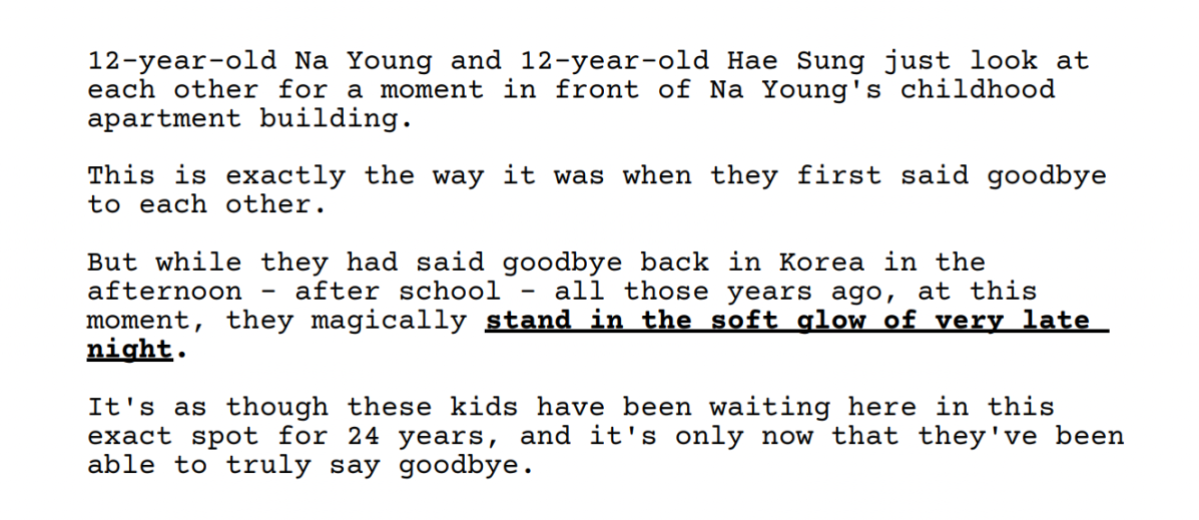This essay about the Past Lives screenplay is part of a series of deep-dive works of criticism about films nominated for the 2024 Oscars released the week before the ceremony.
Every movie begins its life with a writer and a blank page. Eventually, that blank page will turn into a screenplay, which will then become the blueprint for filming the movie, which then must be edited and color corrected and sound designed, and then maybe there are reshoots and ADR and a ruthless studio executive who orders the whole thing re-cut. (Or, as today’s execs do, throw the whole thing away for a tax write-off.) After such a long process from page to screen, many movies end up not resembling the screenplay that got the movie produced in the first place.
That is not the case with Past Lives, Celine Song’s beautiful debut about childhood sweethearts who reunite 24 years after one of them immigrated from Korea to America. If you have yet to see the film, you should watch it as soon as possible. But I think you should read the film, too.
During the post-screening Q&A at the Chicago Critics Film Festival, Song shared that the script alone was her pitch document to A24, who agreed to produce and distribute the film. At the time of her pitch, she only had one off-Broadway play to her name (Endlings, which had the misfortune of premiering in March 2020) and a job as a staff writer for the Amazon Prime adaptation of The Wheel of Time.
As an aspiring filmmaker myself, this is quite literally the dream. And it’s rare to say the least. One of the most respected production companies producing a script (and trusting the writer to direct) based on the power of the words is a scenario one might expect to see in a movie, not in the movie business. And yet, reading the script, it’s easy to see why A24 decided to take this chance on a first-time filmmaker.
This is not to undercut Song’s achievements as a director, which rightfully won her Best Director at the Indie Spirit Awards and First-Time Theatrical Feature Film at the DGA Awards. In interviews, she’s discussed how she isolated the actors physically during the shoot. When Hae-sung and Nora hug in the park, 12 years after falling out of touch and 24 years after Nora left Korea, it was the first time that Teo Yoo and Greta Lee had been in the same physical space as actors. Their first touch is their characters’ first touch. Her masterful use of reflective surfaces (puddles, ponds, windows, mirrors) was a directorial choice as well. (This LA Review of Books piece delves even deeper into Celine Song’s brilliance as a director.)
But so much of what makes the film crackle was in that original draft. This is the work of a filmmaker truly confident in her abilities and that’s evident on the page. Moments like Greta Lee’s fourth-wall breaking stare at the camera — for me, one of the best shots of the movie — is written into the script. And rather than just add a parenthetical of (in Korean), the Korean dialogue is written in Korean and then translated into English.
Song also breaks the widely believed rule of screenwriting to not write things that you can’t film. All screenwriting rules are meant to be broken, but to have the confidence to include long descriptions of a character’s internal reaction is a striking choice for a writer making her debut.
Take the moment Arthur (Nora’s husband) and Hae Sung meet for the first time:

This beautiful description most likely informed John Magaro’s quietly wonderful performance. It also expands on the central theme of Past Lives — understanding the connection between people — in a way that makes the rest of the movie richer. These descriptions helped me feel the gentle maturity of Arthur, the helplessness of Hae Sung, and the longing between the former childhood sweethearts.
Most importantly, it helped me understand the long walk at the end of the film as Nora not only leaving behind her romantic dream of reuniting with Hae Sung, but letting go of the little girl who had that dream. Until I read the script, I didn’t realize that Nora had not yet cried onscreen as an adult, even in the “breakup” scene earlier in the film. Here’s how Song wrote that moment of release.

What struck me most about the script was that the flashbacks to childhood were written on the page, rather than found in the editing room. These flashbacks are crucial to Past Lives’ inyeon-fueled vision of the world: that everything, including things that have happened in our past lives (both literal — the life that Nora left behind in Korea — and figurative — the life that Nora’s soul might have lived before she was born, as a different person or a bird or even a tree), affect what is happening in the present. Nora has a steadfast belief that where she ended up is where she is meant to be. But the flashbacks are literal intrusions of her past life into her present.
The final flashback plays with what we know (and what’s been reinforced through the other flashbacks): Hae Sung and Nora said goodbye at the crossroads between their two houses after school. But this scene twists it.

This moment of magic is what elevates the film from a nice little indie about star-crossed lovers to one of immense thematic powers. Immediately after this flashback is when Hae Sung asks Nora if this is a past life too, which allows them to have a happy ending if not a Hollywood one. The concept of in-yeon, which has been so deftly woven into scenes to this point, crashes through the reality of the film with a devastating effect. Not surprisingly, this exact cut during my first viewing of the film is when I went from teary-eyed to full out bawling. And it was all in the original script.
Through words, Celine Song has managed to evoke exactly how these devastating moments should look and feel on the screen. It’s like she’s creating emotional storyboards for the actors and the crew making the film to follow, like she would use a look-book to create the visual feel of the movie, or a traditional storyboard to explain how a shot should be framed.
After the highs of Asian representation at last year’s Oscars, the momentum did not continue into 2024. Instead Past Lives returned to the Academy’s long tradition of nominating a film with a predominantly Asian cast for Best Picture (and, in this case, Best Original Screenplay) without nominating its performers. Lead actors Greta Lee and Teo Yoo did not receive acting nominations (to me, far worse than the Margot Robbie Barbie snub), and Best Director once again could only make room for one (white) woman. But the Oscars could make Celine Song the first Asian woman to win Best Original Screenplay, and she would deserve it.
Song’s brilliant and emotional script is the reasons she was able to make the movie. The screenplay worked on its own as an exceptionally written piece of text, guided Song and her actors and crew in creating their on-screen masterpiece, and now can enrich the experience for everyone who has seen the film. If Oscar voters actually read the screenplays, Song’s victory would seem undeniable. But even if the Oscars don’t award Song, writing a work of art that results in an even greater work of art is reason enough for her — and us — to celebrate.
Past Lives is now streaming on Paramount+.


